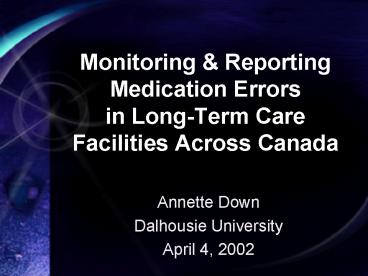Monitoring PowerPoint PPT Presentation
1 / 22
Title: Monitoring
1
Monitoring Reporting Medication Errors in
Long-Term Care Facilities Across Canada
- Annette Down
- Dalhousie University
- April 4, 2002
2
Research Question
- What are the primary areas of focus to consider
in implementing a reporting structure for
medication errors that will reduce this problem
in long-term care facilities?
3
Methodology
- Literature Review
- Meeting with Metro Administration Group
- Interviews with Directors of Nursing, long-term
care pharmacists, LPN licensing body registrar,
pharmacy registrar, Nova Scotia Department of
Health licensing employees, CEO of ISMP Canada
4
Long-Term Care System
- 1917 long-term care facilities across Canada
148, 562 beds - mainly in Ontario - National reporting guidelines are found in
accreditation standards - Less than three quarters of all facilities are
accredited - Provincial legislation regarding pharmacy
services and nursing home operation - Role of licensing bodies
5
What is a Medication Error?
- A preventable event that occurs in the process of
medication use prescribing, dispensing and
administration - Medication errors are usually caused by human
errors that are manifested in drug distribution,
drug names, labeling, computer program design and
drug delivery design - Source ISMP Canada
6
Medication Errors vs. Other Similar Terms
- Adverse drug reaction (ADR)
- Adverse drug event (ADE)
- Drug-related problem (DRP)
- Drug-related morbidity (DRM)
- Preventable drug-related morbidity (PDRM)
7
Scope of the Problem
- No national reporting system in Canada
- The magnitude of the problem in hospitals has
been well-documented not so in the LTC setting - The problem of other drug-related complications
(ADEs, DRM, PDRM, etc) has been studied in the
LTC setting so there is reason to expect
medication errors are also a problem in this
setting - Medication errors are dramatically underreported
in all settings
8
Current Progress to Date
- Various initiatives in acute care sector (I.e.
Capital Health Patient Safety Advisory Group) - Active role of ISMP Canada
- New initiative by Health Canada
- Implications for the LTC setting?
9
Why Should Long-Term Care Administrators Care?
- Economic implications
- direct and indirect costs
- role of pharmacist
- Quality management
- performance indicators
- facility pharmacy reporting structure
- Risk management/resident safety
10
Why do Medication Errors Happen?
- What human factors research tells us
- The Eight Essential Elements of a Safe and
Effective Drug Therapy System often one or more
of these elements are missing - Perceptions of long-term care
providers and pharmacists
11
(No Transcript)
12
(No Transcript)
13
Risk Factors in Residents
- Elderly have a higher average number of
prescriptions compared to general
population - Physiological changes related to aging
place seniors at a higher risk for a
drug-related problem - Knowing the risks is essential to reducing the
potential for error!
14
Common Medications Associated with Error
- Role of specific drugs
- Beers Criteria for Determining Inappropriate
Medication Use in Nursing Home Residents - McLeods Criteria of Inappropriate Practices in
Prescribing for Elderly People - ISMP list of high problem medications
15
Barriers to Reporting
- Organizational policies and procedures
- Strive for error-free practice
- Level of fear
- Traditional reporting for trending purposes
- Lack of statutory protection
- Lack of awareness
- Incentive to report?
16
Barriers to Reporting in the Long-Term Care
Setting
- Fear of reprisal
- Time to fill out the reporting form
- Complexity of the reporting form
- Fear of being viewed as incompetent
- Overcome obstacles by
- simplifying the form
- accepting that human error occurs
- eliminating disciplinary action
17
Consequences of Not Addressing the Problem
- Error will continue to occur
- Negative economic outcomes
- Lack of accountability
- Negative impact on humanistic
outcomes - Legal implications
18
Strategies to Reduce Medication Errors
- The role of the Canadian Council on Health
Services Accreditation - Improve AIM indicators
- The role of the federal and provincial/territoria
l governments - Improve their role
- Develop national reporting structure
- Implement minimum best practice standards
19
More Strategies
- The role of individual long-term care facilities
- Promote seamless care
- Promote a culture of resident safety, not blame
- Promote physician participation
- Implement technology that has the potential to
reduce error
20
Conclusion
- Medication errors are a serious problem
- Reducing medication errors should be a priority
of LTC administrators and health professionals - System-wide approaches are warranted
- Encouraging news The medication-use system can
be improved and doing this has many benefits - A national reporting structure would be beneficial
21
Acknowledgments
- Neil MacKinnon
- Darlene Boliver
- David U
- Candace Allison
- Barb Anderson
- Chris Allbrook
- Joanne Wilson
- Kim Fleming
- Linda Pullen
- Susan Wedlake
- Dawn Frail
- Soili Helppi
- Nancy Keddy
- Peggy Bissonnette
- Ann Mann
- Denise Pellerine
- Carol Goodine
- Natasha Rodney
22
Questions?

